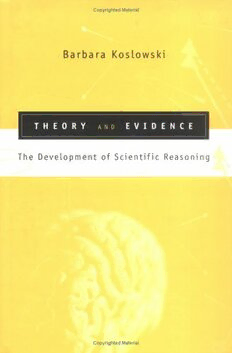
Theory and Evidence: The Development of Scientific Reasoning PDF
208 Pages·1996·13.68 MB·English
Most books are stored in the elastic cloud where traffic is expensive. For this reason, we have a limit on daily download.
Preview Theory and Evidence: The Development of Scientific Reasoning
Description:
In Theory and Evidence Barbara Koslowski brings into sharp focus the ways in which the standard literature both distorts and underestimates the reasoning abilities of ordinary people. She provides the basis for a new research program on a more complete characterization of scientific reasoning, problem solving, and causality. Long acknowledged for her empirical work in the field of cognitive development, Koslowski boldy criticizes many of the currently classic studies and musters a compelling set of arguments, backed by an exhaustive set of experiments carried out during the last decade. Theory and Evidence describes research that looks at the beliefs that people hold about the type of evidence that counts in scientific reasoning and also examines how those beliefs change with age. The primary focus is on the strategies that underlie actual scientific practice: two general sorts of research are reported, one on hypothesis testing and the other on how people deal with evidence that disconfirms a given explanation—the process of hypothesis revision. Koslowski argues that when scientific reasoning is operationally defined so that correct performance consists of focusing on covariation and ignoring considerations of theory or mechanisms, then subjects are often treated as engaging in flawed reasoning when in fact their reasoning is scientifically legitimate. Neither relying on covariation alone nor relying on theory alone constitutes a formula for success. A Bradford Book. Learning, Development, and Conceptual Change series
See more
The list of books you might like
Most books are stored in the elastic cloud where traffic is expensive. For this reason, we have a limit on daily download.
